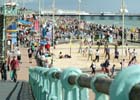The next steps along the road to reviving Brighton seafront will be taken tomorrow (Thursday 22 January).
Council officials are likely to be asked to prepare two crucial reports. The second report, due in September, will tackle the key question – how will it be funded?
Ideas have begun to emerge. Brighton and Hove City Council bosses are in talks to try to work out ways to find the estimated £100 million needed to carry out a major overhaul.
 They are also looking at how to ensure that the restored arches and the seafront generally can be made to pay their way.
They are also looking at how to ensure that the restored arches and the seafront generally can be made to pay their way.
The hole in the road that appeared at the bottom of West Street last April highlighted how urgent the task had become.
The reality is that the ageing seafront arches are far from being a fancy old architectural feature. They play a crucial part in supporting the main road above – the A259 – and are reaching the end of their working life.
A report being presented to the council’s Policy and Resources Committee on Thursday has been published.
It said: “The seafront plays a major part in the tourism offer of the city and therefore contributes significantly to the visitor economy of the city, which is valued at £800 million per year and supports 20,000 jobs.
“It is essential that the seafront is well maintained and managed to not only reduce the health and safety risks but also as a very attractive place to visit.”
Work was already under way to restore and revive some of the rundown arches. The aim had been to carry out the work as construction started on the i360.
The reopened arches are now let to businesses paying rent and rates. Then the hole opened up in the road above the Fortune of War pub.
A scrutiny panel was asked to look at the renovation and rebuilding of structures on the seafront.
 The report to tomorrow’s meeting said: “The range of evidence that was presented led the panel to widen the remit and look at how the seafront could work towards generating more income which could be used to fund structural works.
The report to tomorrow’s meeting said: “The range of evidence that was presented led the panel to widen the remit and look at how the seafront could work towards generating more income which could be used to fund structural works.
“The panel were acutely aware of the financial climate that is facing the council and hence the focus on looking for the seafront to be as self-sustaining as possible.
“The chair highlights that the panel wanted ‘the seafront to retain its unique offer but we have to make the most of every opportunity to raise income while ensuring that the income the seafront generates is used as efficiently as possible to sustain its future’.”
If the seafront is to become self-sustaining, it is likely to be at the expense of some of the traders who will struggle to pay higher rents.
The council is banking on even more demand for the arches on both sides of the Palace Pier once they have been restored.
Money to make a start on the massive makeover could come through the local enterprise partnership (LEP) Coast to Capital.
Some could come from the parking surplus. It has to be spent on transport projects. A contribution could come from Standard Life Investments which is looking to extend Churchill Square down to the seafront and redevelop the Kings West complex and the Brighton Centre.
The council may need to save huge sums of money but it can’t afford to do nothing. On one building alone – the Shelter Hall which used to house the Rip Tide gym – the council is currently spending £100,000 a year on internal scaffolding.
Madeira Terrace may be more problematic. It draws big crowds for events. But day-to-day footfall, rents and rates mean that it would be hard to make any upgrade pay for itself. A conference and concert hall at Black Rock could help.
The road ahead is likely to be far from smooth, with money being only one of the subjects of wrangling. But, to bend the words of Lao Tzu, even the longest journey starts with a single step.







